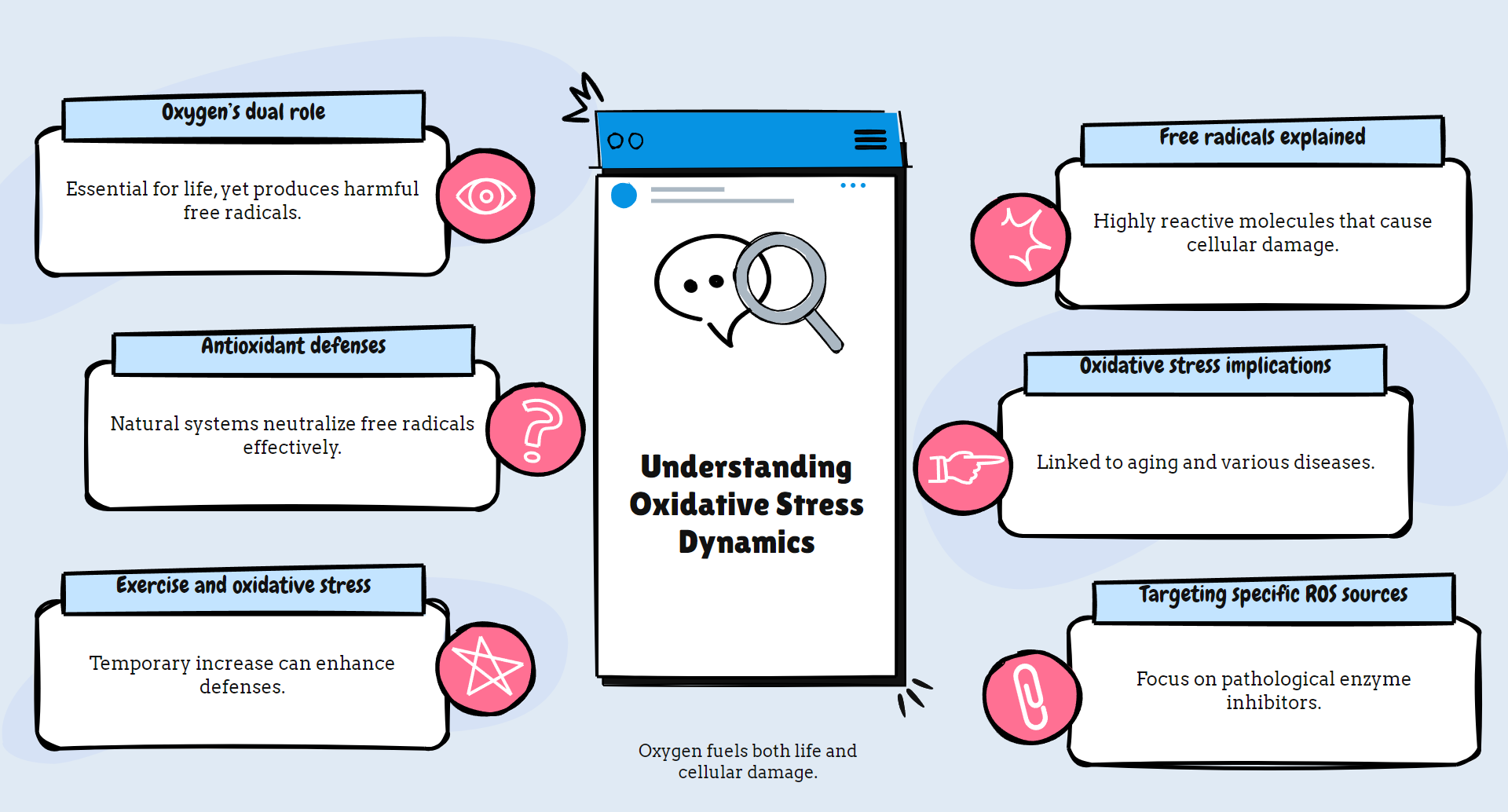
Free Radicals Are Slowly Destroying Your Cells
Free Radicals Are Slowly Destroying Your Cells
Every breath you take triggers a cascade of molecular warfare inside your body. Oxygen, the element we can't live without, paradoxically fuels a continuous assault on our cellular machinery. This invisible battle shapes everything from how we age to why diseases develop.
The science of oxidative stress reveals a fundamental tension at the core of human biology. Our cells require oxygen to produce energy, yet this process generates unstable molecules called free radicals that can damage virtually every component of our cellular architecture.
The Molecular Villains
Free radicals are molecules with unpaired electrons, making them highly reactive and unstable. Like molecular thieves, they steal electrons from nearby structures, creating chain reactions of cellular damage. The primary culprits include superoxide, hydroxyl radicals, and hydrogen peroxide, collectively known as reactive oxygen species (ROS).
Your body produces approximately 10 billion free radicals per day in each cell. Most arise naturally during cellular respiration, where mitochondria convert nutrients into ATP, our cellular energy currency. Others form in response to environmental factors like UV radiation, pollution, and certain medications.
Free radicals are particularly dangerous because of their indiscriminate nature. They attack lipids in cell membranes, proteins that perform vital cellular functions, and even DNA, potentially introducing mutations that can lead to cancer.
Your Body's Defense System
Evolution has equipped us with sophisticated antioxidant systems to counteract this oxidative damage. Enzymes like superoxide dismutase, catalase, and glutathione peroxidase neutralize free radicals before they can cause harm.
This delicate balance between free radical production and antioxidant defense determines our oxidative stress level. When production exceeds our capacity to neutralize these molecules, oxidative stress accelerates aging and increases disease risk.
The relationship between oxidative stress and disease is complex but undeniable. Research has implicated free radical damage in cardiovascular disease, where oxidized LDL cholesterol triggers inflammation in arterial walls. Neurodegenerative conditions like Alzheimer's and Parkinson's show extensive oxidative damage in affected brain regions. Even diabetes progression involves free radical disruption of insulin signaling pathways.
The Oxidative Paradox
Perhaps the most fascinating aspect of free radical biology is its dual nature. While excessive ROS causes damage, these molecules also serve as crucial signaling mediators. They help regulate gene expression, trigger necessary inflammatory responses to infection, and even mediate beneficial adaptations to exercise.
This creates what scientists call the "oxidative paradox." Complete elimination of free radicals would disrupt essential physiological processes, while excessive production accelerates disease. The goal isn't elimination but balance.
Consider exercise, which temporarily increases free radical production. This acute oxidative stress triggers adaptive responses that strengthen antioxidant defenses and repair mechanisms. The body emerges stronger, better equipped to handle future challenges. This hormetic effect explains why moderate exercise promotes longevity despite temporarily increasing oxidative stress.
Beyond Supplements
The nuanced understanding of oxidative stress has profound implications for how we approach health. Early research led to enthusiasm for antioxidant supplements, with hopes they might prevent disease and slow aging. However, large clinical trials have yielded disappointing results, sometimes even showing harm from high-dose supplementation.
This apparent contradiction makes sense when we recognize free radicals' signaling functions. Blanket suppression with high-dose antioxidants can interfere with beneficial adaptations and immune functions. The body's endogenous antioxidant systems, regulated according to need, appear superior to untargeted supplementation.
More promising approaches target specific sources of pathological ROS production. Compounds that selectively inhibit enzymes like NADPH oxidase show potential in conditions where this enzyme drives disease progression. Similarly, mitochondria-targeted antioxidants can protect these critical organelles without disrupting beneficial signaling.
The Future of Redox Medicine
Research into oxidative stress continues to evolve, with several exciting frontiers. Scientists are developing biomarkers to accurately measure oxidative damage in living patients, potentially allowing personalized interventions. Others are exploring the redox regulation of epigenetic modifications, revealing how oxidative stress might influence gene expression across generations.
Perhaps most intriguing is the emerging field of redox medicine, which aims to therapeutically modulate specific redox pathways rather than broadly suppressing free radicals. This approach recognizes the sophisticated redox signaling networks that regulate cellular functions.
Understanding the biochemistry of oxidative stress transforms how we think about health and disease. Rather than viewing free radicals as universal villains, we now appreciate them as part of a complex regulatory system that requires balance, not elimination.
This perspective encourages a more nuanced approach to health. Instead of seeking magic bullet antioxidants, we might focus on lifestyle practices that optimize our endogenous antioxidant systems while minimizing unnecessary oxidative challenges. Regular physical activity, adequate sleep, stress management, and diets rich in diverse plant compounds support our natural defenses without disrupting beneficial signaling.
The molecular battle within our cells continues with every breath. But with deeper understanding comes the potential to influence this ancient struggle, not by eliminating free radicals, but by fostering the resilience that allows our cells to thrive amid life's inherent chemical challenges.
Want more information on this? Join my Metabolic Health Coaching Platform for $10 a month (7-day trial) at https://www.skool.com/metabolichealthcoach
There is a specific course on Nutritional Biochemistry with 94 modules you can take as part of your membership.
